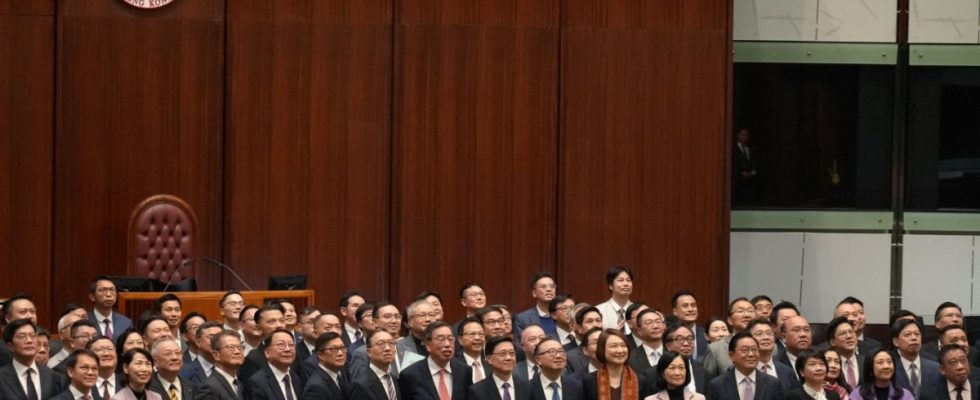Hong Kong’s parliament unanimously passed the announced security law for the Chinese special administrative region on Tuesday. In a session that lasted many hours, MPs rushed the law through the assembly, which was overwhelmingly loyal to Beijing. Prime Minister John Lee spoke of a “proud moment” for the city. They now have the tools to protect themselves against the danger of “black violence”, meaning the demonstrators who, mostly masked, demonstrated against China’s growing influence in Hong Kong in 2019.
When announcing plans for the new security law in January, Lee warned to “watch out for possible acts of sabotage and undercurrents” that would try to cause unrest in the city. The former police chief claimed that some states were still trying to infiltrate the special administrative region. Beijing had already accused foreign actors of provoking discontent in the city in 2019.
The introduction of a security law was already provided for in Article 23 of Hong Kong’s mini-constitution, which came into force after the former crown colony was handed over to Beijing in 1997. A first attempt failed in 2003 due to resistance from Hong Kong residents, who protested against the plans in their hundreds of thousands for fear of abuse.
Experts see the law as an adjustment to Beijing’s policies
After the mass demonstrations in 2019, which were initially directed against an extradition law with mainland China, Beijing forced a security law on the city in a roundabout way. The law passed on Tuesday will not replace this, but rather supplement it.
The previously applicable security law was initially directed against secession, subversion, terrorism and secret agreements with foreign forces. New additions include the offenses of treason, rioting, theft of state secrets and espionage, sabotage to endanger national security and interference from outside. Experts see the law as an adjustment to Beijing’s understanding of “comprehensive” national security, which puts state and party leader Xi Jinping above all else.
In certain cases, the new law gives the police more power to investigate or arrest suspects. Collaborating with an “external force,” such as a foreign government, to weaken or damage infrastructure and thereby endanger national security now carries a life sentence.
According to the Hong Kong government, the local security law that has now been passed was necessary because the law already implemented by Beijing did not yet meet all of the points required by the city’s own constitution. There were almost no protests against the draft in advance. Since the introduction of the first security law four years ago, the authorities have arrested thousands of activists, lawyers and journalists, and hundreds of thousands of Hong Kong residents have left the city or fled.
For decades, the special administrative region was considered a gateway to China; its freedom and rule of law attracted many companies and investors who managed their China business from there. According to the Hong Kong people, the accusation that the law endangers Hong Kong’s reputation is rejected South China Morning Post some politicians back in parliament. They announced that the new regulation would actually strengthen Hong Kong as a financial center. The law is due to come into force on Saturday.

